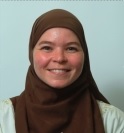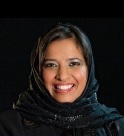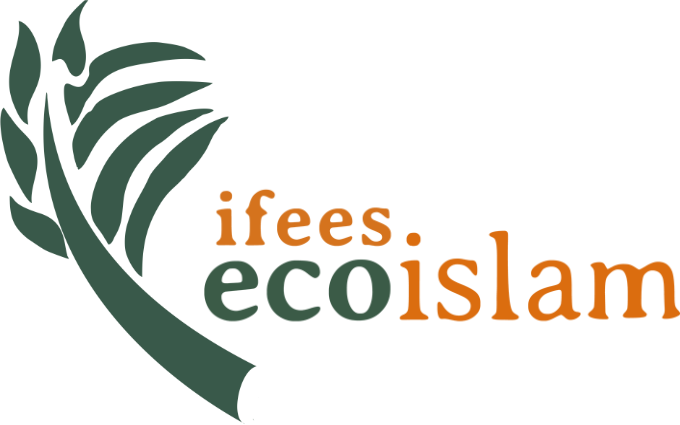Islamic environmentalism expresses itself in personal behaviour. It is an integral part of life, an expression of existence in submission to the will of the Creator in harmony with the cosmic pattern, unfettered by the trappings of career and consumerism. It is a mirror of the life of the Prophet (s). We will attempt in this section to produce a charter that will reflect this and show us the way to protecting the Earth, our only home, from ourselves.
It is He who has appointed you guardians on the earth And raised some of you above others in understanding So He could test you regarding what He has given you
Qur’an, Livestock (Al An’am) – 6:165
Introduction
Our work started nearly thirty years ago motivated by a feeling that there was a large knowledge gap to fill. Environmental issues were appearing in the news more frequently, organisations dealing with these issues were growing in number and yet faith communities that declare an empathy with the natural world were silent. More specifically what has Islam got to say about these matters and what can Muslims draw from its teachings? How can Muslims contribute to stemming the tide that threatens to engulf life on this planet?
It will be observed that the construct of what we have now come to describe as modernity is deeply hostile to the natural world. It makes us uncomfortable to think that we are also part of the problem. But how did Islamic environmental teachings express themselves in the daily lives of Muslims in an Islamic surroundings? As the Islamic tapestry unfolded in its expression over the centuries, we discover that there are no references to the environment in the way we understand it today. The word nature, which is an abstraction cannot be found in the Qur’an and the closest modern Arabic usage is the word bi’a, which connotes a habitat or a surrounding.
The Qur’an speaks of creation (khalq) and it contains two hundred and sixty one verses where this word is used in its various grammatical forms derived from the root kh l q. These verses contain references to the human world; to the natural world of the planet from trees to turtles, from fish to fowl; and to the sun, stars and skies. The very first revelation of the Qur’an to the Messenger of God used this word in its verb form to dramatic effect, “Recite in the name of your Lord who created, created man from clots of blood (96:1). Creation, the natural world, is the fabric into which the tapestry of life is worked.
As there was an Islamic code of conduct that governed inter-personal behaviour and an individual’s rights and responsibilities within a community, so there was a code of conduct governing an individual’s behaviour towards other sentient beings and the rest of the natural world. As Muslim interaction with the environment evolved, it manifested itself into a range of rules and institutions, as an expression of life in all its manifestations embodying what is truly holistic.
As Islam expanded out of its sparse desert environment, it was confronted by many challenges, one of which was relative abundance. This brought about other problems like over exploitation and waste. The Qur’an asks us to be just to our natural surroundings, “We did not create the heavens and earth and everything between them, except with truth” (15:85). Thus a Muslim’s behaviour towards the environment is based on the imperatives laid down in the Qur’an.
They come under numerous headings but they could be distilled into just three categories for our purposes bearing in mind public good to be the ultimate objective. They are to do what is right, forbid what is wrong and act with moderation at all times: “Let there be a community among you who call to the good, and enjoin the right and forbid the wrong. They are the ones who have success” (3:104). The Qur’an again uses an environmental theme in exhorting humankind to be moderate –
“It is He who produces gardens, both cultivated and wild, and palm-trees and crops of diverse kinds and olives and pomegranates both similar and dissimilar. Eat of their fruits when they bear fruit and pay their dues on the day of their harvest, and do not be profligate. He does not love the wasters” (6:142).
Taken as a whole as it was intended to be, caring for Planet Earth our only home was integrated within the framework of the Islamic value system. This was an everyday concern for the Muslim, which the Qur’an draws attention to thus, “We have not omitted anything from the Book” (6:39) and “He said ‘Our Lord is He Who gives each thing its created form and then guides it’” (20:49). Furthermore the Qur’an asserts that the universe was brought into being by Allah, “He is Allah – the Creator, the Maker, the Giver of form. To Him belong the Most Beautiful Names. Everything in the heavens and on the earth, glorify Him. He is the Almighty, the All-Wise” (59:24).
Everything belongs to Allah, “He to whom the kingdom of the heavens and the earth belongs; ….. He created everything and determined it most exactly” (25-2); the real owner of the natural world is the Creator and He has “showered His blessings upon you both outwardly and inwardly” (31-19); He appointed mankind as His “Khalifs (guardians) on the earth …… so He could test you regarding what He has given you (6-165).
What emerged was a three-fold process, which we may classify as legislative principles, institutions and enforcement. The Qur’an laid down the basis from which the Shariah evolved, which in turn determined the nature of Fiqh (Islamic law) and the subsequent establishment of relevant institutions.
The body of the Shariah allows us to deduce three general principles as follows –
- The elements that compose the natural world are common property
- The right to benefit from natural resources is a right held in common
- There shall be no damage or infliction of damage bearing in mind future users
What we are now refer to as “Islamic environmentalism” emerged from this foundational code and Muslim legalists have over the centuries worked out both principles and structures to give expression to this. These principles concern individual rights, obligations and responsibilities individuals owe to the community, accountability, benefits accruing to users from renewable resources held in common and penalties for improper use of natural resources.
Two of the most important institutions to emerge for this framework are the hima and the harim.
The former lends itself to the setting up of a whole range of conservation zones, which may be established by a community or the state for the purposes of protecting land or species of flora and fauna. The latter permits the establishment of inviolable zones, not always but usually, for the protection of water courses. People have a right in the Shariah to create such zones managed by themselves and where use is severely restricted.
Having identified the ethical base and institutions the third element that was needed to complete the picture was a system of accountability. From its earliest years the Islamic state established an agency known as the hisba whose specific task it was to protect the people through promoting the establishment of good and forbidding wrongdoing.
A learned jurist (muhtasib) headed this agency and he functioned like the chief inspector of weights and measures and chief public health officer rolled into one. He was also responsible among other similar duties for the proper functioning of the hima and harim zones and acted as what one may describe as an environmental inspector.
Draft Charter
The compilation of this charter will be managed by the Charter Team below. You will note from their bios that they are seasoned practitioners but also of a kind who will listen to others. This is why we are open to anyone who wishes to participate in this project and if you wish to comment or supply information that would supplement the work of the team please get in touch with us at charter@ifees.org.uk.
Potential contributors to the draft may wish to have recourse to the following two resources both for study and background information. They are:
Environmental Protection in Islam (Second edition 1994). The first edition of this resource was published in 1983 and this tells us that people have been thinking about this matter for nigh on thirty years. This was a joint venture between IUCN (Paris based International Conservation Union) and (MEPA) Meteorology and Environmental Protection Agency, Saudi Arabia and it is also worth noting that one of the members of our charter drafting team was part of the editorial board.
The Charter Team

Rianne ten Veen
Facilitator
Rianne is from The Netherlands and grew up in several countries. Her interest in the environment started when living in an expats’ compound right next to a slum and an oil spill disaster. Her interest in the environment has deepened since converting to Islam due to being convinced about its environmental teachings. Rianne has an LLM, and MA in International Politics and a Post-Graduate Certificate in Environmental Policy.

Faraz Khan
Faraz Khan is an American Muslim social activist and a thinker who holds a M.A. in liberal arts from Thomas Edison State College, NJ and a B.A. degree in Environmental Geology from Rutgers University, NJ. He is a frequent speaker on Islamic Ecotheology and Environmental Ethics in Islam on various college campuses in the US. Aside from his professional career as a wetland scientist for Land Use Regulation for the State of New Jersey, his interest lies in Islamic art, history, philosophy, environmental ethics, and sharia’. He recently conducted interviews with American Muslim scholars and artists on the environmental activism ThinkAsGreen.blogspot.com.

Othman Abd-ar-Rahman Llewellyn
Othman Abd-ar-Rahman Llewellyn is American by birth and he now lives in Saudi Arabia. He is an Environmental Planner and works in the Department of Protected Area Planning at the Saudi Wildlife Authority. He has held this position since 1988. He is an associate of IUCN Commissions dealing with Protected Areas, Environmental Law and the Species Survival Commission, Arabian Plant Specialist Group. His research includes amongst others Interests Islamic Environmental Law and Ethics, Traditional Conservation Practices and Protected Area System Planning. He is a regular contributor to conferences and workshops related to Islamic Environmental Law and Ethics. His pet project is the Jabal Aja biosphere reserve located in the Hail region of North Eastern Saudi Arabia which he established as means to reviving the hima system.

Fachruddin Mangunjaya
Fachruddin Mangunjaya is a conservationist, researcher and associate lecturer at Faculty of Biology, Universitas Nasional, Jakarta. He is PhD in Environmental Management and Natural Resources from Bogor Agricultural University (IPB). Authored several environment books and more than 200 – articles on the environment, Islamic environmentalism, climate change, sustainable development, biodiversity and environmental management in the Indonesian media. He lead a Conservation International (CI) Indonesia Program entitled ‘Religion and Conservation Initiative.’ (2004-2012). And now independent consultant and Lead Author for Indonesian National Council of Climate Change (DNPI), Indonesia.

Khawla Al-Muhannadi
Khawla Al-Muhannadi was born and lives in Bahrain. She has PhD in Social Responsibility in Conservation from an Islamic Perspective and her research interests are primarily environmental in subject areas related to ethics and education amongst others. She is the President of the Environment’s Friends Society in Bahrain and is active in Civil Society in fields related to community outreach and empowerment. She Co-authored a book “Understanding ISO 26000. A Practical Approach to Social Responsibility Status” published in the UK in 2011. She has contributed articles that appeared in UNESCO journals and has given numerous lectures to public audiences and special groups including postgraduate students.
Eat and drink from the provision of Allah, and do not commit abuse on the earth, spreading corruption
Qur’an, The Cow (Al-Baqarah) 2:60

